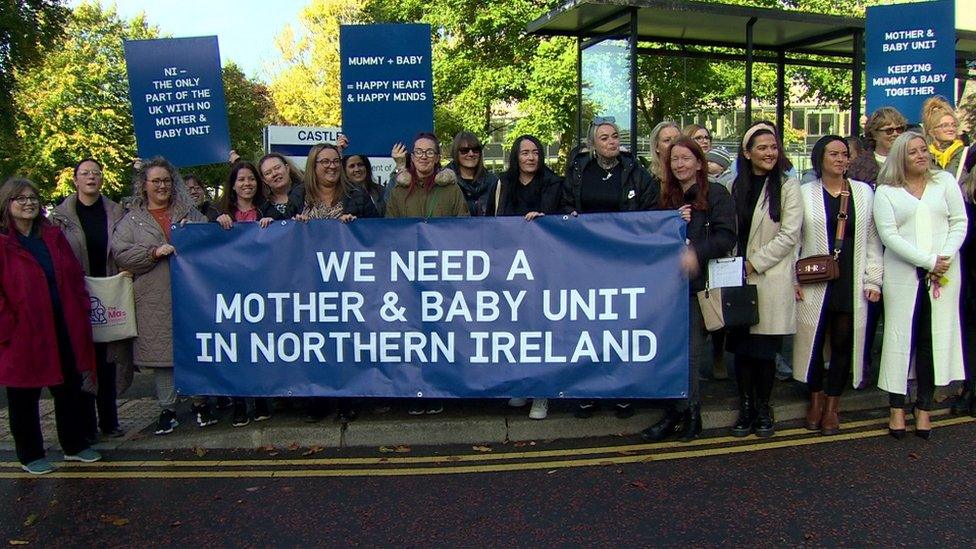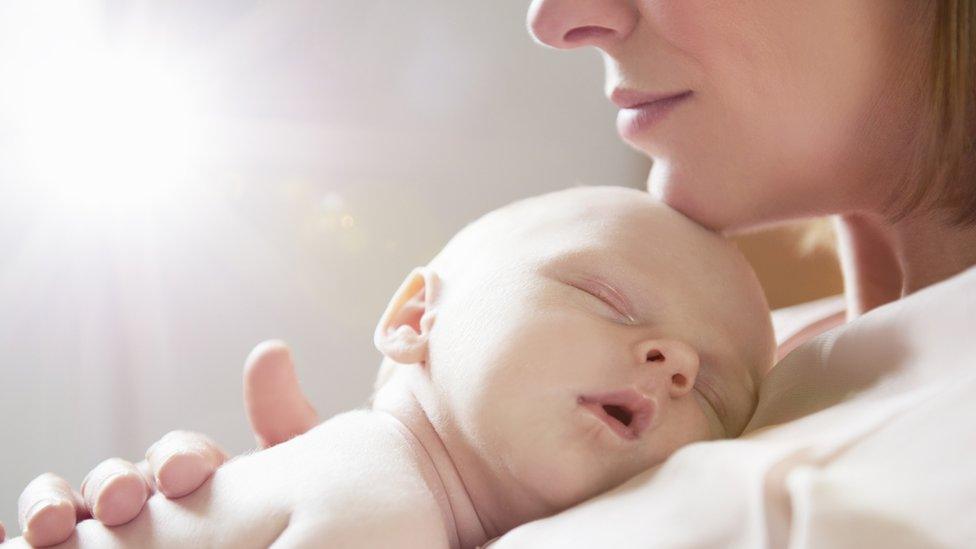Mothers go to Stormont to call for better maternity care
- Published
'We need perinatal services to improve'
A group of mothers are in Stormont to share their experiences of childbirth as part of a campaign for better maternity support services.
They will recount problems with the care they received and call for urgent improvements to services for mothers who develop mental-health issues.
The initiative has been organised by the Mas (Maternal Advocacy and Support) project.
It provides mental-health support to new mothers in eight women's centres.
Jannine Barnes takes part in the Mas project in the Ballybeen Women's Centre in Dundonald, on the outskirts of east Belfast.
She said that poor communication between health workers during postnatal home visits had a negative effect on her mental health as she tried to look after her vulnerable newborn child.
'We never got the same health visitor twice'
"When my youngest daughter was born, she spent some time in neonatal. She had breathing difficulties and it was suggested that she had some holes in her heart," Ms Barnes told the BBC's Good Morning Ulster programme.
"After some time we were released from hospital back home, but we had to have health visitors and midwives coming every other day to check her weight, to make sure that she didn't have to be readmitted to hospital.
"We never got the same health visitor twice. We never got the same midwife" she recalled.
"I was having to continually explain why they were coming out to do weight checks; what was wrong with her breathing; why she was breathing so fast.
"Sometimes we had students coming out and they hadn't been told why there were coming out to check her weight, so it just had a real impact on my mental health."
Women like Ms Barnes will share their stories with assembly members at Stormont on Monday in a bid to give patients a greater voice in the delivery of maternity and perinatal services.
The Mas Project is also calling for better training for health workers on post-partum psychosis, external, a serious mental health illness that affects about one in 500 women after giving birth.
In Northern Ireland the condition affects about 35 women every year, according to Professor Siobhan O'Neill, the region's Mental Health Champion.
She added that postnatal depression was a "significant mental-health problem" in Northern Ireland which resulted in about 70 mothers being admitted to mental health units annually.
Both Prof O'Neill and the Mas Project are supporting the ongoing campaign for establishment a dedicated mother and baby perinatal mental health unit.
Northern Ireland is the only place in the UK which has no dedicated in-patient service for women with serious post-partum mental-health issues.

Women protested at Stormont last month about the lack of a dedicated perinatal mental health unit in Northern Ireland
Prof O'Neill, who was appointed as Mental Health Champion for Northern Ireland last year, said the unit might be expensive in the short-term, but in the long-term it would make "good economic sense".
"The mother-and-baby unit will carry a significant cost and the Department of Health are now looking at that and the strategical outline case will be available in March 2023, so there should be progress then and we'll know exactly how much that will cost and where it will be," she said.
"The work that this group of women have done is just so important in bringing this to the top of the agenda.
"There's clear evidence that intervening at this stage, in those early weeks and months, can make a real difference to women's lives, to babies' lives, and it can reduce the cost of mental-health services that they'll need later on," Prof O'Neill added.
Clare Anderson, co-ordinator of the Mas project, said the mothers involved in the initiative "highlighted key areas that would make a difference to their experience such as compassion, non-judgement, better communication, signposting to services and earlier identification of a perinatal mental health problem".
"We understand how stretched the health service is and how hard they are working but we want health leaders to see the care from the perspective of the women they treat," she added.
Related topics
- Published21 November 2022

- Published10 October 2022
